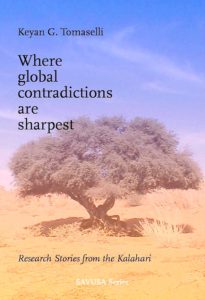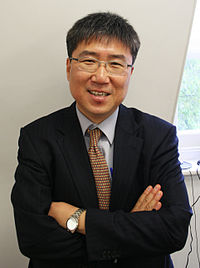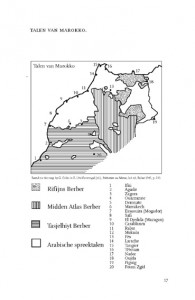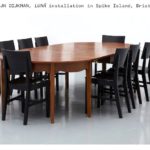YouTube Channel African Studies Centre Leiden
The African Studies Centre Leiden is the only multidisciplinary academic knowledge institute in the Netherlands devoted entirely to the study of Africa. It has an extensive library that is open to the general public. The ASCL is an interfaculty institute of Leiden University. The institute is located in the Pieter de la Court Building of the Faculty of Social Sciences of the University of Leiden, Netherlands.
YouTube channel: https://www.youtube.com/user/AfricanStudiesCentre
Published on May 19, 2015
Film about the workshop ‘Governance and Connections in Africa’s Contemporary Conflicts’ (19 March 2015) and public lecture ‘Globalised Conflict Situations – Nigeria’s Boko Haram in Perspective’ by Egosha E. Osaghae, Professor of Comparative Politics and Vice Chancellor of Igbinedion University, Okada, Nigeria (20 March 2015). Organized by the African Studies Centre in Leiden.
Exposing The Myths Of Neoliberal Capitalism: An Interview With Ha-Joon Chang
For the past 40 years or so, neoliberalism has reigned supreme over much of the western capitalist world, producing unparalleled wealth accumulation levels for a handful of individuals and global corporations while the rest of society has been asked to swallow austerity, stagnating incomes and a shrinking welfare state. But just when we all thought that the contradictions of neoliberal capitalism had reached their penultimate point, culminating in mass discontent and opposition to global neoliberalism, the outcome of the 2016 US presidential election brought to power a megalomaniac individual who subscribes to neoliberal capitalist economics while opposing much of its global dimension.
What exactly then is neoliberalism? What does it stand for? And what should we make of Donald Trump’s economic pronouncements? In this exclusive interview, world-renowned Cambridge University Professor of Economics Ha-Joon Chang responds to these urgent questions, emphasizing that despite Donald Trump’s advocacy of “infrastructure spending” and his opposition to “free trade” agreements, we should be deeply concerned about his economic policies, his embrace of neoliberalism and his fervent loyalty to the rich.
C. J. Polychroniou: For the past 40 or so years, the ideology and policies of “free-market” capitalism have reigned supreme in much of the advanced industrialized world. Yet, much of what passes as “free-market” capitalism are actually measures designed and promoted by the capitalist state on behalf of the dominant factions of capital. What other myths and lies about “actually existing capitalism” are worth pointing out?
Ha-Joon Chang: Gore Vidal, the American writer, once famously said that the American economic system is “free enterprise for the poor and socialism for the rich.” I think this statement very well sums up what has passed for ‘free-market capitalism’ in the last few decades, especially but not only in the US. In the last few decades, the rich have been increasingly protected from the market forces, while the poor have been more and more exposed to them.
For the rich, the last few decades have been “heads I win, tails you lose.” Top managers, especially in the US, sign on pay packages that give them hundreds of millions of dollars for failing — and many times more for doing a decent job. Corporations are subsidised on a massive scale with few conditions — sometimes directly but often indirectly through government procurement programs (especially in defense) with inflated price tags and free technologies produced by government-funded research programs. After every financial crisis, ranging from the 1982 Chilean banking crisis through the Asian financial crisis of 1997 to the 2008 global financial crisis, banks have been bailed out with hundreds of trillions of dollars of taxpayers’ money and few top bankers have gone to prison. In the last decade, the asset-owning classes in the rich countries have also been kept afloat by historically low rates of interests.
In contrast, poor people have been increasingly subject to market forces.
In the name of increasing “labor market flexibility,” the poor have been increasingly deprived of their rights as workers. This trend has reached a new level with the emergence of the so-called “gig economy,” in which workers are bogusly hired as “self-employed” (without the control over their work that the truly self-employed exercise) and deprived of even the most basic rights (e.g., sick leave, paid holiday). With their rights weakened, the workers have to engage in a race to the bottom in which they compete by accepting increasingly lower wages and increasingly poor working conditions.
Read more
Where Global Contradictions Are Sharpest ~ ‘Op die Grond’: Writing In The San/d, Surviving Crime
 I must go away. There to the sand, to the sand. To that Kalahari I must go. Where the grass is
I must go away. There to the sand, to the sand. To that Kalahari I must go. Where the grass is
(Anna Swart, interview, 2000).[i]
Getting there
Out of these sands and sunshine deeply embedded in our past is our future –
(Botswana World Tourism Day poster, 27 Sept 1999).
July 12, 2002. The armed guard at Makro, a giant wholesaler in Durban, was wearing a bulletproof vest. We were doing our last minute shopping. I’d never seen a guard in-store before. During apartheid, unarmed, mainly black guards, would, on entry to a store, politely and gingerly search customers’ bags for bombs, guns and grenades. Nelia Oets, already in Upington, 1200 kms to the northwest, called just before my group left Durban. She had been mugged and had hurt her ankle, and might have to cancel her participation. This was serious as Nelia’s 4X4 was crucial to the trip. We arrived at the Upington Protea Hotel, owned by Mary Lange’s brother-in-law, 24 hours later. Nelia had called us by mobile phone earlier. She was on her way to the Molopo Lodge, her foot in a brace.
At the periphery
The next morning in Upington I filled up with petrol. The attendant told me to lock my car. A local gang was casing us. A retired couple at the Molopo Lodge 200 kms north mentioned to us later that they had been targeted while at an Upington supermarket. The receptionist at the hotel in Upington mentioned the busload of Taiwanese tourists who had recently been held up, Ned Kelly style, on the Maputu corridor highway. Two white members of our party complained of being closely shadowed by a security in-store guard: no one was above suspicion. At the supermarket a newspaper vendor insisted on pushing my trolley. He refused to loosen his grip until Vanessa McLennan-Dodd and I had unpacked its contents into the Sani. He was allowed to sell papers at the front of the store provided he prevented trolley theft. Stolen shopping was usually taken to the lokasie (‘location’ – black dormitory area near Upington) where there are few shops, where most of the working class, poor, and unemployed live. While clinging onto the trolley, the vendor vigorously shooed away the odd beggar and other would-be helpers/assailants/muggers. Not a policeman in sight. I bought a Sunday Times from the vendor in gratitude and paid off the ever-watchful car guard. In the newspaper the ‘Careers’-section reported that the Western Cape was experiencing a recruitment boom, though hiring was flat in the other eight provinces (Sunday Times Careers 14 July 2003: 1). Maybe Upington, in the Northern Cape, was at the epicentre of this flatness?
When we got back to the hotel, ready to leave for the Kalahari, we learned that Marit Sætre, an MA-student from Norway, had become violently ill. It must be the soapy water, we thought. She explained that the four Norwegians registered in our Programme in Durban during 2002 periodically succumbed to a 24-hour tummy bug. In the future, I’ll not make fun of First World students whose overseas doctors tell them not to drink the (very clean) Durban tap water, eat the salad, or forget their malaria pills. So we left Charlize Tomaselli and Lauren Dyll with Marit at the Hotel, which offered them free lodging. Both later complained of having been accosted by drunken white men in the streets during broad daylight. Vanessa and I drove on to Witdraai, two hours north on tar, where we were to meet Nelia, graduate students Linje Manyozo and Tim Reinhardt, Damien Tomaselli and Sherieen Pretorius, who had arrived there on the 11th.
Charlize reported that Marit was admitted to hospital that afternoon. The hospital demanded R1,000 in cash up-front for the ward. The manager refused to accept Marit’s Norwegian medical insurance, her father’s card number, or my gold card and ID-numbers, which I phoned through from the Lodge. Wealth before health! Or, perhaps the fear of Marit not settling her debt was as great as was the fear of the vendor losing a trolley? A matter of degree perhaps? Eventually Charlize persuaded the hotel to advance the hospital’s charge. The hospital obviously had little understanding of how to deal with international visitors or global insurance companies, in an otherwise remote province, which prides itself on its unique tourism attractions.
Read more
Decolonising the University: The African Politics Reading List
 Democracy in Africa ~ In response to requests from colleagues and friends, we have assembled a reading list on African Politics. This reading list is collated in solidarity with those who are currently attempting to decolonise the university across Africa, and beyond. We welcome your recommendations of outstanding scholarship to add to this bibliography.
Democracy in Africa ~ In response to requests from colleagues and friends, we have assembled a reading list on African Politics. This reading list is collated in solidarity with those who are currently attempting to decolonise the university across Africa, and beyond. We welcome your recommendations of outstanding scholarship to add to this bibliography.
NB: Currently, this list focuses on English translations and texts but we are in the midst of developing lists in other languages and would welcome your suggestions below.
Go to: http://democracyinafrica.org/decolonising-the-university-the-african-politics-reading-list/
Ikkattinn – Berberse volksverhalen uit Zuid-Marokko
In Noord-Afrika worden van oudsher Berberse talen gesproken. De geschiedenis leert ons dat het altijd al een gebied is geweest waar verschillende culturen elkaar hebben ontmoet en waar verschillende talen naast elkaar hebben bestaan.
Zo werd er tijdens de Romeinse overheersing van Noord-Afrika (van de tweede eeuw voor Christus tot de zesde eeuw na Christus), naast genoemde Berberse talen, Latijn en Punisch gesproken. In het begin van de achtste eeuw na Christus begon de islam zich over Noord-Afrika uit te breiden en dat bracht een verspreiding van Arabische spreektalen met zich mee. Dit proces verliep in het ene gebied langzamer dan in het andere. Zo was waarschijnlijk de overgrote meerderheid van de Marokkaanse bevolking tot ver in de 19e eeuw Berbertalig. In Marokko werden tijdens de periode van koloniale overheersing (1912-1956) Frans en Spaans aan de reeds aanwezige talen toegevoegd.
“In negen landen van Noord-Afrika worden tegenwoordig Berberse talen gesproken. Het totale aantal sprekers is ongeveer vijfentwintig miljoen. We onderscheiden acht à tien verschillende Berberse talen die weliswaar taalkundig sterk verwant, maar in praktijk in wisselende mate onderling verstaanbaar zijn. Als taalfamilie behoren Berberse talen bij het Afroaziatisch”.
Verreweg de meeste Berbertaligen vinden we in Marokko, een land met 30 miljoen inwoners. Naar schatting de helft van de Marokkanen spreekt van huis uit een van de drie Marokkaanse Berberse talen (voor de geografische verspreiding zie het kaartje): Rifijns Berber (Tarifiyt) in het noorden, met ongeveer twee miljoen sprekers; Midden-Atlas Berber (Tamazight) in het midden, met ongeveer vier miljoen sprekers en Tasjelhiyt Berber (Tasjelhiyt of Tasusiyt) in het zuiden, met ongeveer negen miljoen sprekers.
Veel Berbertaligen zijn uit hun oorspronkelijke woongebied geëmigreerd, zowel naar gebieden binnen hun eigen vaderland als naar andere landen. De grootste stad van Marokko, Casablanca, is voor zestig procent Berbertalig; één op de twaalf inwoners van Parijs spreekt een Berberse taal.
Als gevolg van arbeidsmigratie vanuit Marokko, vanaf de jaren zeventig van de vorige eeuw, hebben zich in Nederland veel Marokkanen gevestigd. Thans, 2005, wonen er ongeveer 300.000 Marokkanen in Nederland. Hiervan is driekwart Berbertalig, dus ongeveer 220.000 mensen, waarvan waarschijnlijk 180.000 Rifberbers en 40.000 Berbertaligen uit de Midden-Atlas en Zuid-Marokko.
Het Tasjelhiyt Berber van Zuid-Marokko is naar aantal sprekers de grootste Berberse taal van Marokko. De noordelijke grens van het Tasjelhiyt Berber-taalgebied wordt gevormd door de noordelijke rand van de Hoge-Atlas; de zuidelijke grens is de denkbeeldige lijn van Foum Zguid, een plaats ten zuiden van Ouarzazate, in het oosten, tot het plaatsje Ifni aan de kust in het westen. De oostelijke grens is de denkbeeldige lijn van Demnate, over Ouarzazate naar Foum Zguid. De westelijke grens is de kust van de Atlantische oceaan, tussen de steden Essaouira en Ifni. Ten zuiden van de stad Demnate gaat het Tasjelhiyt Berber geleidelijk over in het Berber van de Midden-Atlas.
as-Sûs al-Aqsâ
Het Tasjelhiyt Berberse taalgebied, dat in oppervlakte ongeveer vier keer zo groot is als Nederland, was bij de oude Arabische geografen en historici bekend als as-Sûs al-Aqsâ “de verafgelegen Sous”. De Sous is de naam van de grote vlakte ten oosten van Agadir. Vandaar dat het Tasjelhiyt Berber ook wel Sous Berber wordt genoemd. In Franstalige werken noemt men deze taal gewoonlijk “Chleuh” of “Tachelhiyt”. Read more
The Open Library of Humanities
 The Open Library of Humanities (OLH) is a charitable organisation dedicated to publishing open access scholarship with no author-facing article processing charges (APCs). We are funded by an international consortium of libraries who have joined us in our mission to make scholarly publishing fairer, more accessible, and rigorously preserved for the digital future.
The Open Library of Humanities (OLH) is a charitable organisation dedicated to publishing open access scholarship with no author-facing article processing charges (APCs). We are funded by an international consortium of libraries who have joined us in our mission to make scholarly publishing fairer, more accessible, and rigorously preserved for the digital future.
The OLH publishing platform supports academic journals from across the humanities disciplines, as well as hosting its own multidisciplinary journal. Launched as an international network of scholars, librarians, programmers and publishers in January 2013, the OLH has received two substantial grants from the Andrew W. Mellon Foundation to date, and has built a sustainable business model with its partner libraries.
All of our academic articles are subject to rigorous peer review and the scholarship we publish showcases some of the most dynamic research taking place in the humanities disciplines today – from classics, modern languages and cultures, philosophy, theology and history, to political theory, sociology, anthropology, film and new media studies, and digital humanities. Our articles benefit from the latest advances in online journal publishing – with high-quality presentation, annotative functionality, robust digital preservation, strong discoverability and easy-to-share social media buttons.
Our mission is to support and extend open access to scholarship in the humanities – for free, for everyone, for ever.
Go to: https://www.openlibhums.org/




